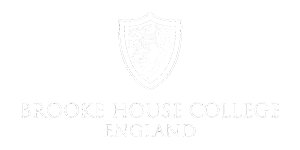
Brooke House College
Brooke House College is a co-educational independent boarding school, providing education to pupils aged 12-20, in Leicestershire. REQUEST INFORMATION..
KEY INFORMATION:
Brooke House college offers GCSE, A Level & UFP curriculum. They deliver a strong IELTS & EAL for international students. Full boarding is offered on site in their Market Harborough grounds, catering to both UK & international students. Brooke House college has an established Special Education Needs (SEN) provision. Read more below ...






Six steps to Brooke House College
Our method to your success
FREE CONSULTATION MEETING
REPORT & INSTITUTION SHORTLIST
APPLY & RECEIVE AN OFFER
WOO HOO! YOUR OFFER IS ACCEPTED
ARRIVAL & POST ARRIVAL SUPPORT
WE ARE WITH YOU EVERY STEP OF THE WAY
LOOKING TO FIND OUT MORE ABOUT Brooke House College?
Find out more about term times & course requirements by leaving some details below
HISTORY:
The history of the main campus' beautiful Georgian building is shown above in the Elms document. Brooke House College's involvement at the site started when the former Collegiate School moved from the main High Street in 1957 into what was then The Elms. After permission had been sought and granted from the Brooke and de Capell Brooke family for the new school to adopt the name 'Brooke', and The Elms was re-named Brooke House, the Collegiate School became Brooke House College. The school was bought by Mr Charles Lister and his wife, but it struggled financially and was eventually bought by Mr Donald Williams and Mrs Joan Williams, who founded the new Brooke House College in 1967-68 academic year. To mark the anniversary, the school celebrated its 50th anniversary with events around the world involving its alumni.In its early days, the school was a 14 - 21 age group school, which was run as a 'crammer' for pupils wishing to re-sit their A levels in order to gain entry to university. As time progressed, the school changed to meet demand and had to adapt to changing economic circumstances. As a result of the changes and adaptations, the school took on more of an international student body, but remained quite small.
EXTRA-CURRICULAR:
In 2008 the college added its football academy. Initially starting with 11 players. This side of the school has grown to now have roughly 150 players. The age limit of pupils accepted into the school has been altered as well over the years and after Department for Education approval in 2018, the school transitioned away from 14-21 to an initial 14-19 and then on to 11 - 19, which has seen the school admit 11 year olds into key stage 3 for the first time in the school's history in September 2019.The Football Academy gives students the option to develop their sporting interest alongside their academic achievements. Students take part in competitive fixtures and are given the opportunity to train with professional English clubs. 2018 saw the introduction of girls in to the academy, joining the boys after ten very successful years as an all-male programme.The football academy has also adapted and is now co-educational like the rest of the school. The non-footballing students enjoy all that a traditional English boarding school has to offer in terms of a broad curriculum, wide-ranging activity programme and a range of possible routes through the school.
ENGLISH SUPPORT:
The School is a family run, co-educational, international college for students aged 11-19, wishing to undertake their general secondary education within the British curriculum.Preparation classes support international learners in their university destinations. Taster programmes can be arranged by request. There is capacity for 300 students and currently these come from over 55 different countries.
POST-16 QUALIFICATIONS:
These are broadly the traditional key stage 3, GCSE and on to A Levels prior to university, or following the Intensive English faculty's programme of elementary, pre-intermediate and intermediate classes as well as the highly respected IELTS qualification.
PRE-16 QUALIFICATIONS:
The final academic pathway is following the school's University Foundation Programme. This is predominantly a one-year pre-university course, but a specially adapted two-year course is also available where levels of English would suggest the one-year course to be too challenging.The final academic pathway is following the school's University Foundation Programme. This is predominantly a one-year pre-university course, but a specially adapted two-year course is also available where levels of English would suggest the one-year course to be too challenging.
ACCOMMODATION:
Boarding houses can be found on and off the main Brooke House campus. As a rule, all students under 16 will be accommodated on campus. Students will only be permitted to live in over 18 accommodation if they have parental permission. All supervised accommodation has at least one live-in, full-time, residential tutor. The over 18 boarding houses are supervised by the head of boarding & pastoral care.All boarding houses offer age appropriate accommodation, comfortably equipped with a wide range of facilities. Students may stay at the College over the weekends and during half term, and this is provided at no extra charge. Each house has a residential tutor who oversees the personal development of their students.
PASTORAL:
The whole pastoral system is formally supervised and monitored by the Designated Safeguard Lead DSL and the proprietor with the pastoral care brief. The residential staff are also all trained first aiders and trained to deliver certain medicines. Regular audits are carried out on the facilities as a part of a routine maintenance process and so that each house is compliant with ISSRs and NMS.

Ruby,
17 from Vietnam, studying- A level Business Studies, Government & Politics, Maths and Further MathsHow did you feel when you first arrived?
I joined Brooke House in September 2017 and was warmly welcomed by the team; everything was good.What did we do to help you settle in and make you feel at home?
The staff and students helped me a lot to get used to everything here; they gave me instructions and advice.Which co-curricular activities do you get involved with?
I have joined a number of clubs including music and sports. I enjoy spending time with my friends too.What are the key things you feel you will take out of being here at Brooke House?
• I will make friends for life.
• My English will improve significantly.
• I will get high grades to get into a top university.Why would you recommend Brooke House to your friends?
• This is a very safe and friendly place to learn.
• Teachers are very good and experienced.
• The activities are good.
• Accommodation with en-suite is convenient.
Victory, 17, from Nigeria, studying at the Football Academy with A level Business Studies, PE and PsychologyHow did you feel when you first arrived?
I joined Brooke House in September 2017 and felt good when I arrived.What did we do to help you settle in and make you feel at home?
Friendly students and staff who helped guide me through problems.Which other activities do you get involved with?
I am a member of the Brooke House College Football Academy.What are the key things you feel you will take out of being here at Brooke House?
• I will make friends for life.
• My football skills will be improved.Why would you recommend Brooke House to your friends?
It is a good school that respects cultures and has good coaches to help guide us through football.
Benjamin, 15, from Germany, studying at the Football Academy with GCSE Maths, Science, Geography, English, PE and Business StudiesHow did you feel when you first arrived?
I joined Brooke house in September 2017 and felt excited, a little bit nervous but happy.What did we do to help you settle in and make you feel at home?
I had a nice resident tutor, and my teachers and other students were also nice.Which other activities do you get involved with?
I am a member of the Brooke House College Football Academy.What are the key things you feel you will take out of being here at Brooke House?
• My learning and study skills will develop ready for university
• My English will be better
• There will be an improvement in my football.
Why would you recommend Brooke House to your friends?
I really enjoy being here so would tell them to come here too.Why would you recommend Brooke House to your friends?
I really enjoy being here.
LIFE AT Brooke House College
We have been helping overseas students gain entrance to Brooke House College for a number of years now, progressing to high profile careers in the UK. Find out more about this school below.
Review
Coming Soon
 LOOKING FOR AN ONLINE COURSE?
Our team can help you find a relevant course for your study.
BOOK A CALL
LOOKING FOR AN ONLINE COURSE?
Our team can help you find a relevant course for your study.
BOOK A CALL
DOWNLOAD YOUR FREE GUIDE TO A QUALITY UK EDUCATION
Sign up to our free Newsletter and you'll get a free copy of our guide to accessing a UK education to help you navigate the entire process.
REQUEST INFORMATION..
Get free instant access to exclusive content and join our monthly email guide
We’re with you every step of the way and will keep you updated on the latest UK education news. Find out more about joining.
